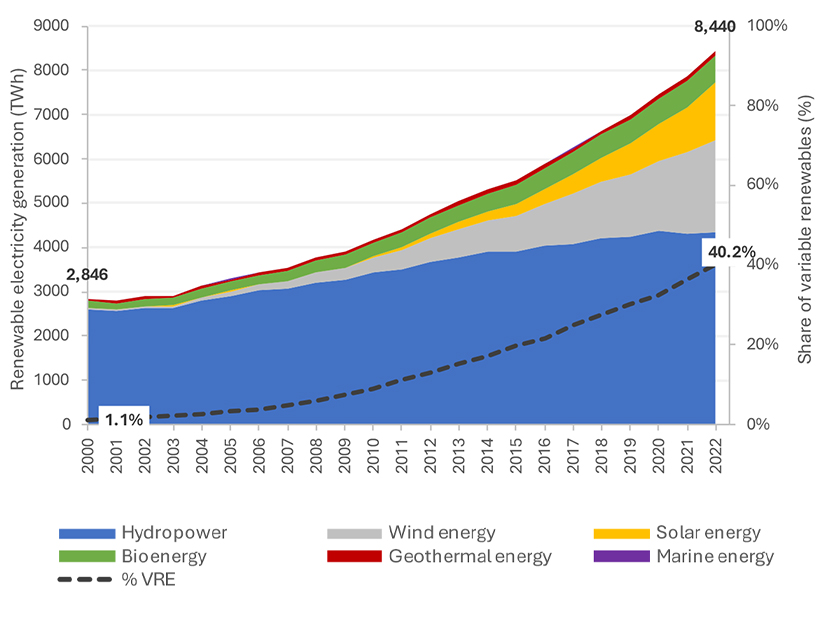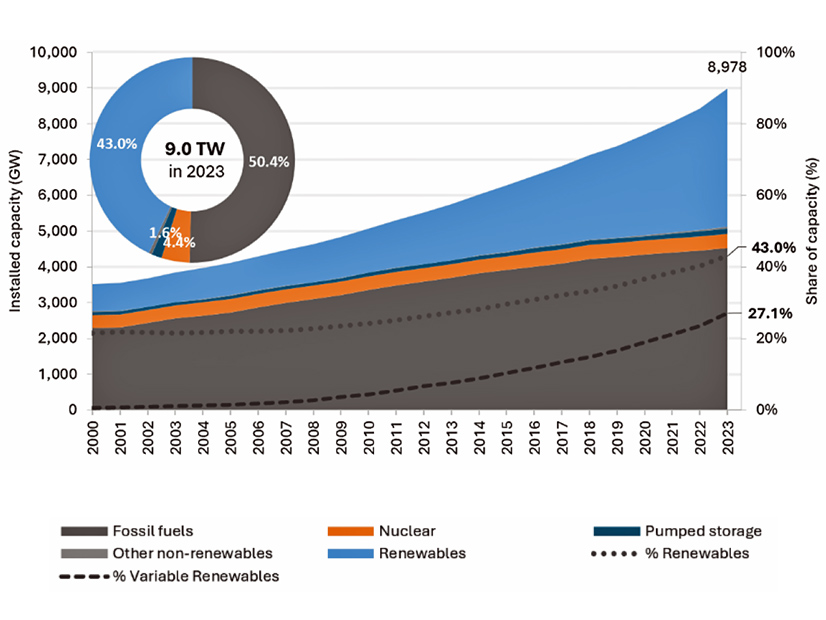
The latest statistical report by the International Renewable Energy Agency shows global buildout of renewables progressing too slowly to meet the 2030 target IRENA set to limit global warming.
Installed capacity of renewables rose 14% in 2023, IRENA said July 11 as it announced the release of “Renewable Energy Statistics 2024.” That is the largest one-year jump this century and compares with 10% compound annual growth from 2017 to 2023.
But even if the world could bump its renewables 14% higher every year, it would reach only 9.7 TW installed capacity by 2030, 13.4% short of the 11.2 TW specified in the 1.5° C Scenario devised by IRENA and endorsed by world leaders at COP28.
Continued growth of 10% per year puts the world at only 7.5 TW of renewables by 2030, or 67% of the target.
In the announcement, IRENA Director-General Francesco La Camera said: “Our new report sheds light on the direction of travel; if we continue with the current growth rate, we will only face failure in reaching the tripling renewables target agreed in the UAE Consensus at COP28, consequently risking the goals of the Paris Agreement and 2030 Agenda for Sustainable Development.”
La Camera also flagged the geographic disparity in the report’s data — 3,749 TWh of renewable energy was generated in Asia in 2022, for example, compared with just 205 TWh in Africa.
“These patterns threaten to exacerbate the decarbonization divide and pose a significant barrier to achieving the tripling target,” La Camera said.
The executive summary accompanying the report breaks out some global statistics:
-
- Renewable energy sources generated 29.1% of the 29,031 TWh generated in 2022, the last full year for which generation data is available.
-
- Total electric generation grew 2.4% per year from 2011 to 2022; renewable generation grew at an annual rate of 6.1%, and nonrenewables grew at 1.3%.
-
- Variable resources — wind and solar — climbed from 1.1% of renewable generation in 2000 to 40.2% in 2022.
-
- Solar (1.42 TW), hydro (1.27 TW) and wind (1.02 TW) accounted for almost all renewable energy nameplate capacity online in 2023, with bioenergy a distant fourth place at 149 GW.
-
- Hydro (4,330 TWh), wind (2,098 TWh) and solar (1,294 TWh) accounted for most of the renewable energy generated in 2022, with bioenergy relatively close behind at 619 TWh.
-
- North America generates the most electricity from renewables of any region per capita; it generates the second-highest number of renewable watts of any region; and the renewable percentage of its electricity mix is fifth highest.
-
- The huge gap between Asia’s 3,749 TWh of renewable generation and Africa’s 205 TWh indicates a disparity in consumption as well — Asia’s electricity mix is 26% renewable, while Africa’s is 23% renewable.
-
- The Middle East region was far behind the rest of the world on renewable energy use in 2022, deriving just 3% of its electricity from renewable sources, while South America was far ahead, deriving 75% of its power from renewables, much of that hydropower.
COP28 President Sultan Al Jaber said: “Today’s report is a wakeup call for the entire world: While we are making progress, we are off track to meet the global goal of tripling renewable energy capacity to 11.2 TW by 2030. We need to increase the pace and scale of development.”




